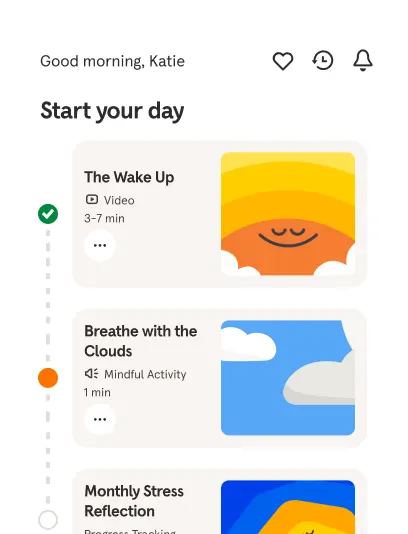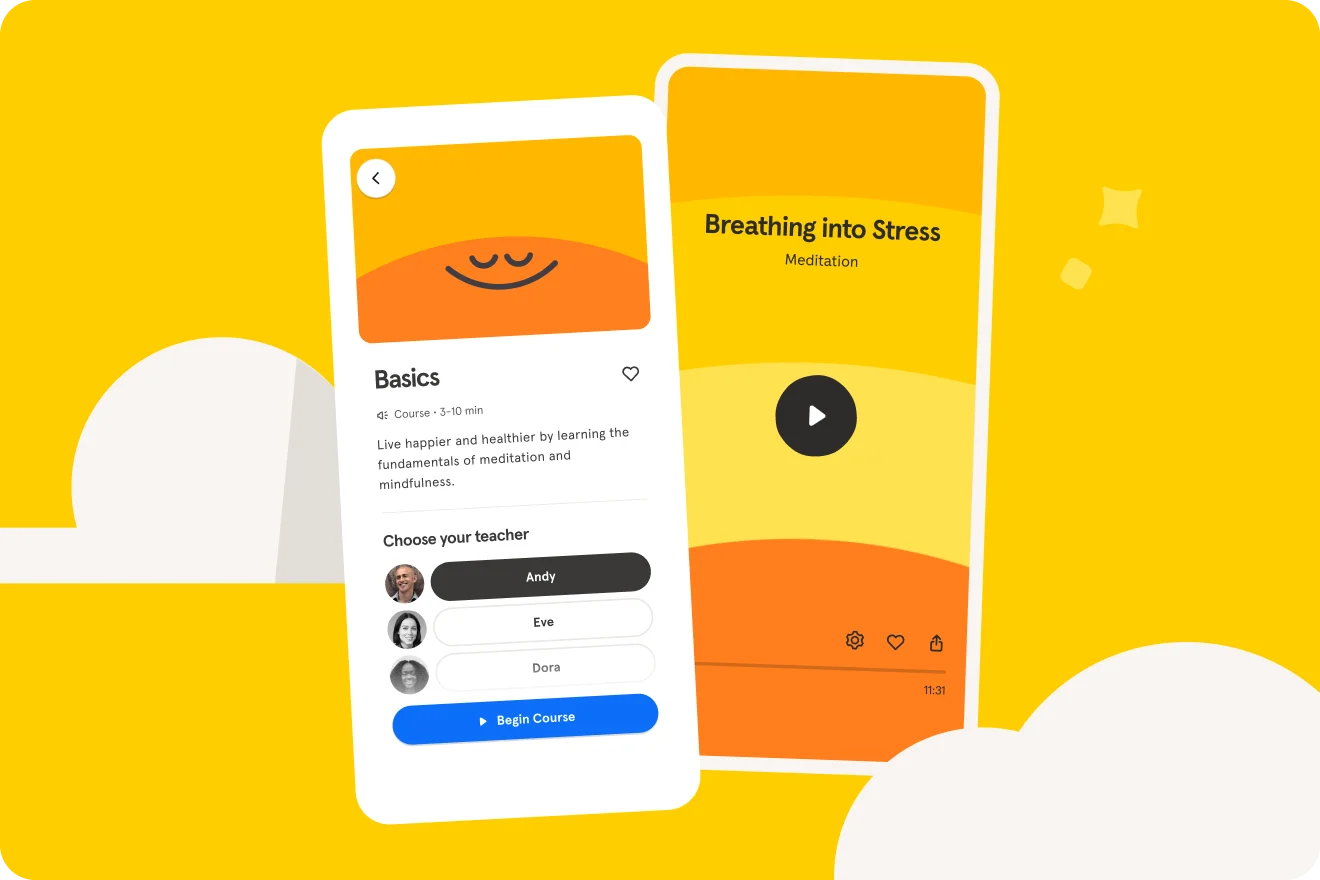Difficult Conversations
The prospect of a difficult conversation can drive feelings of anxiety and fear, but by lessening habits of reactivity and developing a calmer, more patient mindset, you can both listen and express yourself more clearly.
Try 14 days freeBetter mental health starts with Headspace. Unrivaled expertise to make life feel a little easier, using guided meditations, mindfulness tips, focus tools, sleep support, and dedicated programs.
Try 14 days free
Hi, and welcome to the Headspace difficult conversation exercise. Now, whether this is a personal conversation, a professional one, whether you're going to be having to bring something up that might be difficult for others, or you're going into a situation where you're anticipating somebody else bringing something difficult up. This exercise is all about grounding yourself, finding a degree of calm and clarity in the mind. Often when we're anticipating something happening, we get caught up in anxious thoughts, fearful thoughts. We might even feel very passionate about something and it might lean sometimes towards sort of even angry thoughts. So it's really important that we find a way of just stepping out of the thinking, moving away from the very reactive sort of mindset. And instead moving towards a calmer, softer, more responsive mindset. Not only allows us to listen to the other person, but it also allows us to express our own thoughts and feelings in a way that hopefully the other person will listen to and respect equally. So just take a moment to get comfortable. If you can, find the place where you're not going to be disturbed and just take a big, deep breath, breathing in through the nose and out through the mouth. As you breathe out, you can just gently close the eyes and just feel the weight of the body sinking down into the chair or surface beneath you. And just take a moment just to notice how the body's feeling, notice any sense of anxiety or restlessness, perhaps that feeling of nervous anticipation, whatever it might be. Just building up a picture of how the body feels, all the while it's as though you're just sort of sinking down into the body. That feeling of the body pressing down, getting stronger, the sensation of the feet or the legs on the floor, getting stronger. The hands, the arms resting on the legs. And for a moment just letting any thoughts go. So just allowing the mind to do its own thing, just bringing your attention to the feet on the floor, bringing your attention to the body pressing down on the seat. Knowing that this is not only a focal point now, but something you can come back to even within that conversation, just knowing you have a safe place to come back to, to feel grounded in the body. Noticing how the body's breathing, perhaps the breath's starting to slow down a little bit. You can just gently place your hand on your stomach if you find that helpful. Again, just allowing thoughts to do their own things, not getting involved in them. And then just bringing the attention back once again to that solid feeling of the feet on the floor, body pressing down against the seat and the surface beneath you. And when you're ready, just gently opening the eyes again....
Details
About your teachers
- More about Andy
A former Buddhist monk, Andy has guided people in meditation and mindfulness for 20 years. In his mission to make these practices accessible to all, he co-created the Headspace app in 2010.
- More about Eve
Eve is a mindfulness teacher, overseeing Headspace’s meditation curriculum. She is passionate about sharing meditation to help others feel less stressed and experience more compassion in their lives.
- More about Dora
As a meditation teacher, Dora encourages others to live, breathe, and be with the fullness of their experiences. She loves meditation’s power to create community and bring clarity to people’s minds.
- More about Kessonga
Kessonga has been an acupuncturists, therapist, and meditation teacher, working to bring mindfulness to the diverse populations of the world.
- More about Rosie
Rosie Acosta has studied yoga and mindfulness for more than 20 years and taught for over a decade. Rosie’s mission is to help others overcome adversity and experience radical love.

Your lifelong guide to better mental health
Stress, sleep, and all the challenging emotions — care for your mind with the everyday mental health app that's shown to make a difference.
Try 14 days free
Look after your mind
Proven guided meditations and programs to help you stress less, sleep more soundly, and better navigate life’s challenges

Science-backed
Studies show that using Headspace for 30 days can reduce stress, increase resilience, and improve overall well-being

Explore 1000+ expert-led exercises
Access our library of meditations, breathing exercises, and guidance videos for stress, sleep, focus, everyday anxiety , parenting, and more.
Member reviews
Hear from some of our members
Your app brings so much peace and tolerance to our home.
Rachel
UK
Changing my thoughts has allowed me to change my life.
Davide
London
The stress and loneliness courses … taught me how to comfort myself.
Alicia
Canada
Headspace provides me with … a connection to myself, and a disconnection from negative thoughts, feelings, and sensations.
Keri
UK
Related to 'Difficult Conversations'
- © 2024 Headspace Inc.
- Terms & conditions
- Privacy policy
- Consumer Health Data
- Your privacy choices
- CA Privacy Notice

